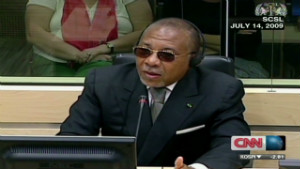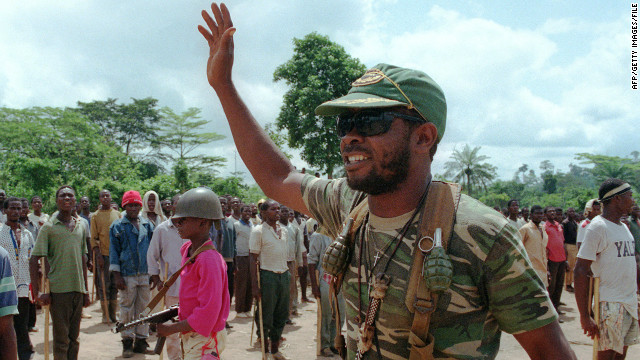- Charles Taylor has been a pivotal figure in Liberian politics for decades
- He led country during bloody civil war that left 200,000 dead from 1989
- He was indicted by U.N. court over his involvement in Sierra Leone civil war
- British supermodel Naomi Campbell appeated as witness for prosecution
(CNN) -- A lay Baptist preacher or a brutal warlord on trial in an international court: in Charles Taylor, the myth and the man, became inseparable.
Accusations of cannibalism swirled around the former Liberian president even as he quoted scripture to his supporters, many of whom he was accused of terrorizing into voting for him during the 1997 elections.
Taylor has been a pivotal figure in Liberian politics for decades, with his overthrow of the regime of Samuel Doe in 1989, spiraling the country into a bloody civil war that left 200,000 dead over the next 14 years.
He was infamous for filling his forces' ranks with drugged child soldiers who reportedly called him "Pappy."
Look at high-res photos of the Charles Taylor years
 Charles Taylor 'crimes against humanity'
Charles Taylor 'crimes against humanity' But it was over his involvement in the civil war in Sierra Leone that Taylor was indicted and put on on trial in 2007 at the Special Court for Sierra Leone sitting in The Hague, Netherlands. United Nations officials and the Sierra Leone government jointly set up the tribunal to try those who played the biggest role in the atrocities.
The first African leader to appear before an international war crimes tribunal, he pleaded not guilty to 11 counts of war crimes and crimes against humanity, and other violations of international humanitarian law.
He was found guilty of aiding rebels who raped, killed and mutilated civilians in neighboring Sierra Leone. But prosecutors failed to prove he had command over the rebels, said Justice Richard Lussick. If jailed the 64-year-old could serve time in a British prison.
Taylor spoke at a sentencing hearing at the court on Wednesday; judges are due to sentence him on May 30. Prosecutors have said he deserves an 80-year prison sentence to reflect the gravity of the crimes.
He is accused of arming rebel groups and terrorizing civilians during the decade-long Sierra Leonean civil war in exchange for uncut diamonds smuggled out to him in empty mayonnaise jars.
During the trial British supermodel Naomi Campbell was summoned as a witness for the prosecution. She told the court she received a gift of "dirty-looking stones" from two men following a dinner hosted by then-South African President Nelson Mandela in 1997.
The prosecution argued the stones were "blood diamonds" -- a personal gift from Taylor. That claim contradicted Taylor's testimony that he never handled the precious stones that fueled the conflict.
It was one of the many instances of high drama in a trial that started with Taylor's dismissal of his entire defense team.
But always lurking behind the spectacle of the trial was the specter of the more than 50,000 killed, maimed or missing in Sierra Leone's civil war.
According to Amnesty International, that conflict "was characterized by some of the worst abuses known: widespread deliberate and arbitrary killings of civilians, torture, including rape and deliberate amputation of limbs, and abduction and forced recruitment of large numbers of people, including children."
Deliberating for more than 12 months, they waded through 50,000-plus pages of testimony and examined more than 1,500 exhibits.
Sierra Leone remains one of the most impoverished countries in the world and many of those who survived the civil war still bear its scars.
U.S. degree
Taylor remained in power for six years until 2003 when heavy international pressure forced him from office. He lived in exile in Nigeria, where border guards arrested him in 2006 as he was attempting to cross into Chad.
Born in 1948, Taylor was the third of 15 children of Americo-Liberian parents, descendants of the freed American slaves who established the Liberian republic in the 19th century.
His father sent him to the United States, where he obtained a degree in economics from Bentley College in Massachusetts.
He became involved in radical Liberian student politics. Influenced by Marxist and Pan-African ideas, he once advocated burning down the Liberian Embassy in Washington. He earned cash in his spare time working on a production line at a toy factory.
He became a teacher and was part of Doe's government in 1980 before being exiled to the United States.
In the U.S. he was jailed for allegedly stealing $900,000 in Liberian government funds -- only to escape from a Massachusetts prison, along with four petty criminals, in 1985 after a year in captivity.
In 1989, he returned to West Africa and launched a revolt from the Ivory Coast against Doe, an ethnic Krahn who had taken power in a military coup.
Taylor's campaign turned into an ethnic conflict, with seven factions fighting for control of the country and its resources -- particularly iron ore, timber and rubber.
Taylor's forces included children, often dressed in costumes and blond wigs. Often under the influence of drugs, they were noted for their brutality.



 Charles Taylor, leader of the rebel National Patriotic Front of Liberia (NPFL) waves to recruits 28 May 1990 upon seizing the port of Buchanan, 200 kms (120 miles) from the capital Monrovia.
Charles Taylor, leader of the rebel National Patriotic Front of Liberia (NPFL) waves to recruits 28 May 1990 upon seizing the port of Buchanan, 200 kms (120 miles) from the capital Monrovia.  Rebels loyal to Charles Taylor take position behind a truck in May 1990 in Monrovia.
Rebels loyal to Charles Taylor take position behind a truck in May 1990 in Monrovia.  A masked rebel loyal to warlord Charles Taylor patrols in the streets of Monrovia in August 1990.
A masked rebel loyal to warlord Charles Taylor patrols in the streets of Monrovia in August 1990.  Liberian President Charles Taylor, right, chats to Nigerian counterpart Olusegun Obasanjo during a symbolic bonfire to destroy weapons in Monrovia in July 1999.
Liberian President Charles Taylor, right, chats to Nigerian counterpart Olusegun Obasanjo during a symbolic bonfire to destroy weapons in Monrovia in July 1999.  A child soldier wearing a teddy bear backpack points his gun at a photographer in a street of Monrovia in June 2003.
A child soldier wearing a teddy bear backpack points his gun at a photographer in a street of Monrovia in June 2003.  Charles Taylor is comforted by his wife, Jewel Howard-Taylor, at the funeral of his mother in July 2003 in Monrovia.
Charles Taylor is comforted by his wife, Jewel Howard-Taylor, at the funeral of his mother in July 2003 in Monrovia.  Charles Taylor, left, sits beside Liberia's new President Moses Zeh Blah during a swearing-in ceremony in Monrovia in August 2003.
Charles Taylor, left, sits beside Liberia's new President Moses Zeh Blah during a swearing-in ceremony in Monrovia in August 2003.  Charles Taylor waves as he boards a Nigerian government plane in Liberia August 2003 that will take him into exile.
Charles Taylor waves as he boards a Nigerian government plane in Liberia August 2003 that will take him into exile. 
 Charles Taylor waits for the start of the prosecution's closing arguments during his trial at the U.N. Special Court for Sierra Leone in February 2011.
Charles Taylor waits for the start of the prosecution's closing arguments during his trial at the U.N. Special Court for Sierra Leone in February 2011.